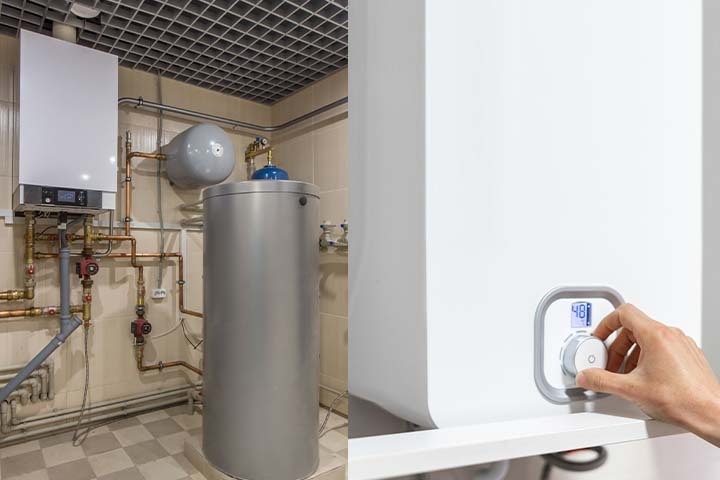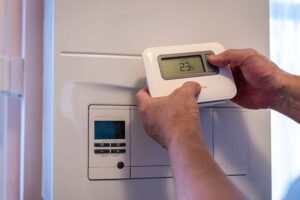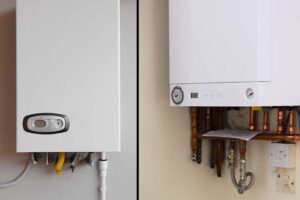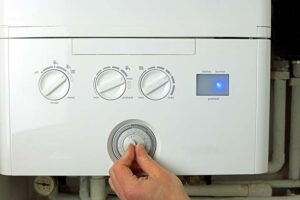Choosing a boiler for your house can be just like picking your team in some game. Because you always want to be on the winning side. Among the most popular types of boilers, two major ones are system boilers and combi boilers.
For large, more spacious houses with multiple bathrooms, it would be practical to select a system boiler. You could get plenty of hot water, if necessary, for one or more taking a shower at the same time – all on demand.
Combi boilers are most suitable for houses or apartments, preferably of average sizes. You only take hot water after it is demanded upon since that is how your combi instantly heats the water. But you might have to wait a little longer if multiple people need hot water at once.
Below, we consider in greater detail system boilers vs combi boilers and the main differences between these two types to help you make a choice as to which best fits your home and lifestyle.
What are System Boilers and Combi Boilers?
System boiler: It is a type of boiler that works in conjunction with a separate hot water cylinder. This, in turn, stores a supply of hot water, which is distributed around your home. This way, you are assured that during busy moments when many people in the house use hot water simultaneously, there will still be a good supply of it.
Combi boiler: A combi or combination boiler, is a variant of a condensed boiler. That means it functions as an all-in-one unit with both heating and domestic hot water facilities. The turning on of a tap starts the immediate heating of cold water passing over the combi boiler.
Combi Boilers vs System Boilers Overview
| Feature | Combi boiler | System boiler |
|---|---|---|
| Hot Water Storage | No | Stored in a cylinder |
| How Hot Water is Supplied | Heated instantly as required | Stored and available when required |
| Ideal for | Smaller homes with lower hot water demand | Larger homes with higher hot water demand, multiple bathrooms |
| Space Requirements | Compact, requires less space | Requires more space for the cylinder |
| Underfloor Heating | Generally compatible, may require adjustments | Generally compatible, may need modifications |
| Advantages | Compact, efficient, and cost-effective for smaller homes | Provides a consistent hot water supply, ideal for larger homes |
| Disadvantages | May struggle to provide hot water to multiple outlets at once | Requires more space for the cylinder |
System Boiler vs Combi Boiler: Key Differences
Two major and most usual boilers for house heating and supplying hot water are combi and system boilers. Despite their absolutely similar purpose of use, the essence of both mentioned is significantly different regarding design and operational features as well as suitability for families.
1. Size and Components
Combi boilers are compact and self-contained units. They house all the necessary components, including the heat exchanger and pump, within a single casing.
System boilers, on the other hand, consist of two main components:
- Boiler unit: This is the unit that heats the water.
- Hot water cylinder: A separate tank storing the volume of hot water for ready consumption.
This makes system boilers larger and a bit more tricky to install by requiring more room.
2. Hot Water Supply
Combi boilers heat water on demand. When you turn on a tap, the combi boiler instantly heats the water that flows through it. They have no storage capacity for hot water.
System boilers utilise a hot water cylinder to store a supply of hot water. This allows for a consistent flow of hot water to multiple outlets at once. Even during periods of high demand.
3. Performance
Combi boilers may experience limitations during peak demand periods. When multiple outlets are in use simultaneously (e.g., multiple showers running), the flow rate may decrease. And the water temperature could drop.
System boilers can provide a constant and steady flow of hot water, even when several outlets are on. The stored water in the cylinder ensures a steady supply without variation in pressure, regardless of demand.
4. Efficiency
Combi boilers are generally more energy-efficient than system boilers. Since they only heat the water that is actually used, there is minimal heat loss.
System boilers might be slightly less efficient than regular boilers since some heat can be lost from the hot water cylinder. However, this has been reduced quite considerably by advances in cylinder insulation.
5. Suitability for Different Households
Combi boilers are right for smaller homes with two or one bath, where your hot water demand is low.
System boilers better fit large homes with many bathrooms or where several people often use hot water at the same time. The stored hot water in the cylinder ensures a consistent supply even during peak demand times.
6. Installation
Combi boilers have generally been faster and easier to install because of their small size and fewer connections. System boilers are a bit more complicated to install since they have additional connections to the hot water cylinder.
Combi vs System Boiler Efficiency
Combi boilers are efficient. Since they heat the water on demand only, there is no need to store a large amount of water heated at all times. Therefore, reducing the loss of heat.
This means a lot of energy is saved. As a matter of fact, with an A-rated new combi boiler installed in place of an old boiler, you are able to save up to 40% yearly in energy bills.
System boilers are also highly efficient. Because they recover heat that would have been wasted and thus are considered more energy-friendly. Their efficiency can be further enhanced by using smart controls, such as thermostats and timers.
As they can help to optimise their operation. However, with the presence of a separate hot water cylinder, they do not operate as efficiently as combi boilers, with some heat being lost.
Cost of Combi Boiler Vs System Boiler in 2025
| Boiler Types | Cost (excl. installation) | Cost (incl. installation) | Average Cost (incl. installation) |
|---|---|---|---|
| Combi | £500 – £3,000 | £1,500 – £4,500 | £3,000 |
| System | £580 – £3,500 | £1,580 – £5,000 | £3,290 |
Reasons to Choose a Combi Boiler
Combi boilers are increasingly popular and for good reasons. Here are some reasons why owners of households have opted for them:
1. Space-saving:
Combi boilers are extremely compact. They are all in one unit. Hence, you do not have to use any bulky hot water cylinders that will just occupy a great deal of space in your home. This is the reason why they are ideal for smaller homes or for those with limited space.
2. Instant Hot Water:
No waiting for hot water to work its way out to you. Combination boilers provide domestic hot water instantly, and at any time when required. That becomes an essential commodity at rush hour every morning and just about any time that a refreshing shower might be considered necessary.
3. High Efficiency:
Combi boilers are really designed to be highly efficient. Since they heat water on demand, you’re only heating the water you actually use. This minimises heat loss and equates to lower energy bills compared to traditional systems with large storage tanks.
4. Installation Ease:
Most installations are quicker and easier compared to system boilers. Without the installation and linking of a separate cylinder, the overall installation process can be less bulky and faster.
Drawbacks of Combi Boilers
1. Not Suitable for All Properties:
Combi boilers depend on the strength of your mains water pressure. When you have low water pressure, a combi boiler is not able to provide enough hot water.
2. Inadequate Quantity of Hot Water:
A Combi boiler finds it challenging when one has to supply hot water to various outlets at the same time.
Especially during peak hour requirements such as showering or washing dishes. It either reduces the water pressure or lowers the temperature of the water.
3. May Require the Upgrade of Piping:
Most of the older homes are made of plumbing not designed to accommodate such high-pressure water delivered from a combi boiler. This will then require the plumbing system to be upgraded, adding to some extra cost altogether.
How Much Does a Combi Boiler Cost?
You can expect to pay between £2,000 and £4,000 for a new combi boiler, installed. In fact, the real cost of a new combi boiler can vary a great deal: depending on a number of factors, which include Combi boiler brand and model, and the complexity of the installation.
Reasons to Choose a System Boiler
System boilers will work perfectly for a house featuring higher hot water demands. Here’s why:
1. Perfect for Multi-Bathroom Homes:
A system boiler is a lifesaver if there is more than one bathroom; it’s like having hot water on the tap constantly. You can easily take showers or run baths without problems of running out of hot water or any drop in pressure.
2. Quick Response to Hot Water Needs:
These system boilers have been designed in a way to quickly respond to your demand for hot water. Equipped with built-in pumps inside them, they pump the hot water around the home efficiently so that you would not have to wait any longer for the supply of hot water to arrive.
3. No Loft Tank:
Remember those old boilers with huge water tanks in the loft? Well, with system boilers, you eliminate the need for those bulky tanks. They take their supply of water directly from the mains, freeing up useful loft space.
Disadvantages of System Boilers
While system boilers hold many advantages, there are the following points for consideration:
1. They Need Large Space:
Definitely, they occupy more space in rooms than the compact combi boiler models. In other words, one needs to fix space for that separate hot water cylinder along with the boiler unit.
2. Proper Sizing of the Cylinder:
This is all about the size of the cylinder. When it is too small, after some showers or baths, you may need to wait for the cylinder to refill, which is very annoying.
3. Not Instant Hot Water:
Although system boilers give good water flow, it is just not as instant as you get with a combi boiler. You will find only a slight wait ahead of you before the hot water reaches the tap.
How Much Does a System Boiler Cost?
The upfront cost of system boilers is probably higher than that of the Combi. Boiler prices go from some £580 to £3,500, based on brand, model, and features. Installation is across the board – from £1,580 to £5,000.
Choosing the Right Boiler for Your Home
Feeling overwhelmed with choices when choosing a boiler? Well, here is some simplified information to help make your decision easier:
1. Consider Your Home’s Needs:
- Size Matters: How big is your house? The apparent fact is that the bigger the home you have with many bathrooms and bedrooms, the greater the power needed for your boiler compared to small ones.
- Hot Water demands: Do you have a large family with many showers and baths throughout the day, or is your demand for hot water a bit more modest?
- Number of Radiators: This is pretty much the number of radiators you have. And it basically means that the more you have, the more powerful your boiler needs to be in order to keep your home warm.
2. Think Your Budget:
- Upfront Cost: Combi boilers are cheaper up-front as compared to system boilers.
- Running Costs: Keep the long-term operation costs in your mind. An energy-efficient boiler will save you later on energy bills.
- Installation Costs: The cost of installation also can vary a lot – the jobs might turn out to be really complicated.
3. Not Forgetting Your Lifestyle:
Prefer to have hot water instantly? Combi boilers ensure instant hot water.
Would you want the demand for hot water to be constant, especially during peak demand? Then, you may want to consider a system boiler.
Or the problem is a space issue? Therefore, combi boilers are compact and hence easier to fit into smaller space spaces.
4. Seek Professional Advice:
Consult a qualified Gas Safe registered installer who can assess the particular needs of your home and recommend a boiler that best suits your needs.
Get multiple quotes from various installers for price and service comparison.
So, Combi or System Boiler?
Eventually, it comes down to your particular needs: with combi boilers being an excellent choice for a small house where hot water needs are not as great. They are really very convenient, efficient, and even save space.
In case you have a large house with many bathrooms or high pressure on hot water, be sure that a system boiler will serve all the household members with a constant supply of hot water.
Frequently Asked Questions
There is no single “best” boiler. The best choice for you depends exclusively on the particular demands and requirements of your specific home. A big family, lots of bathrooms? You will be better off with a system boiler. If space is smaller and hot water demand is lower, then a combination boiler would be more practical.
Generally, yes. Combi boilers are generally more efficient. Because they only heat the water you actually use and cut down on a lot of waste heat.
That depends on how much hot water you are using. Overall, a combi boiler is more economical when that amount of hot water is not needed. But over time, that system boiler of yours will pay for big households with quite a lot of hot water consumption.
Combi-boilers are all-in-one units, heating water on demand. They work best for small homes. System boilers contain a separate hot water cylinder to store hot water. These are better suited for larger homes with higher demands.







